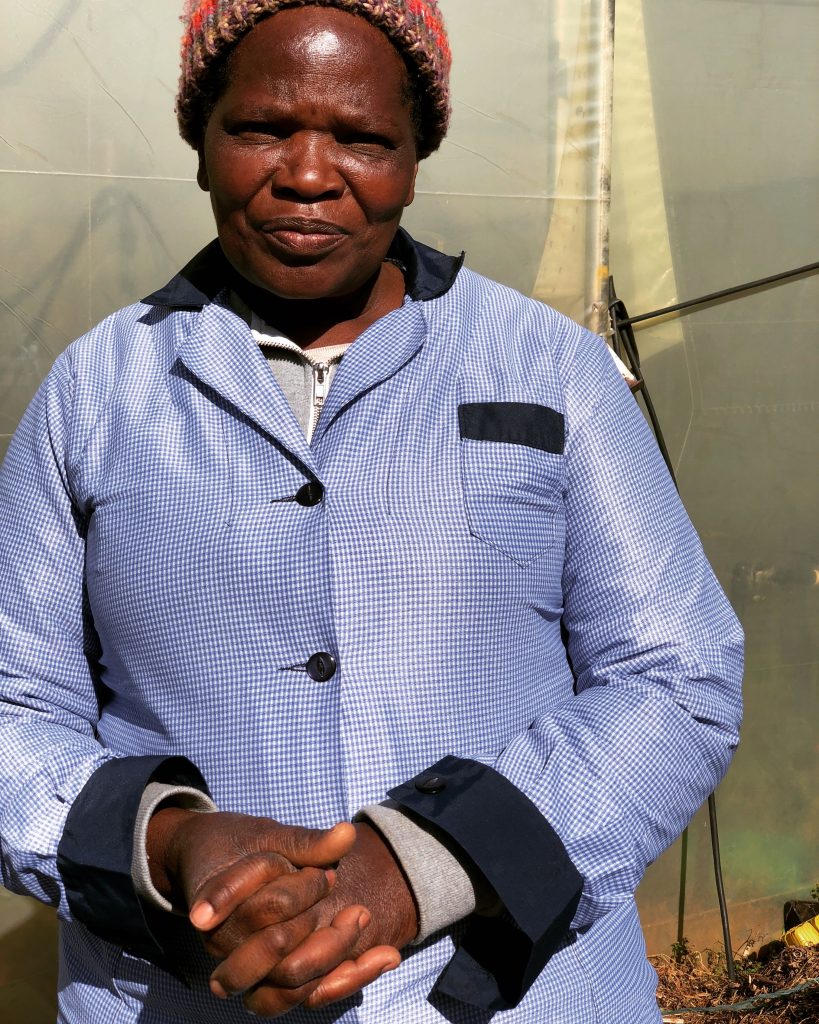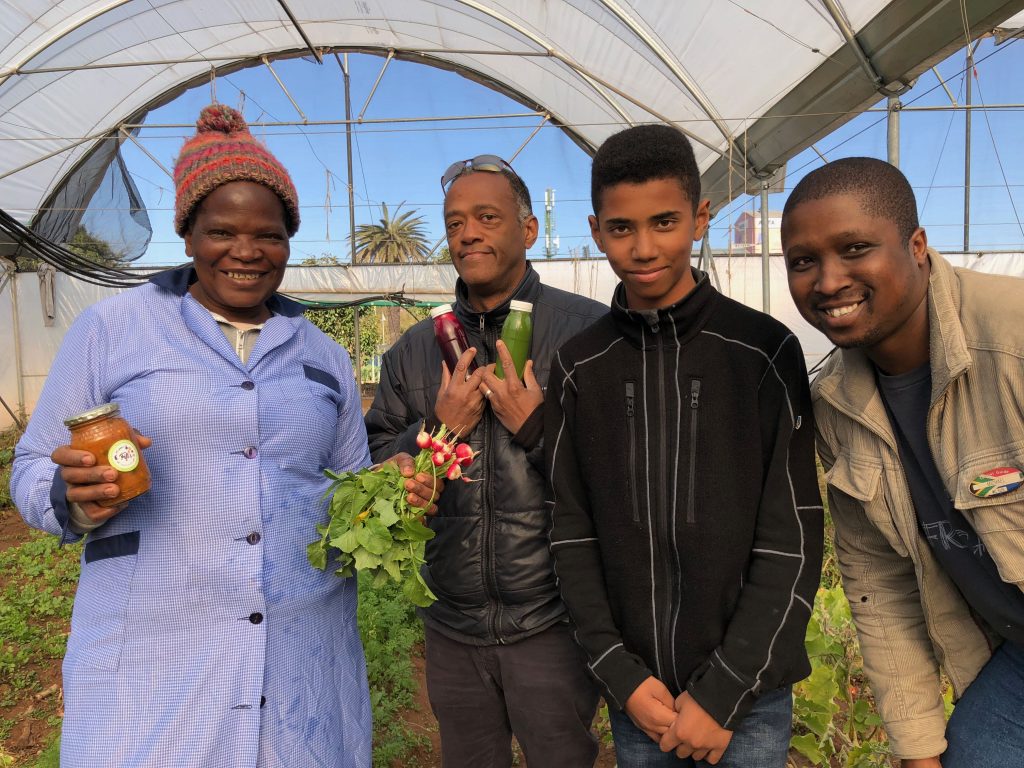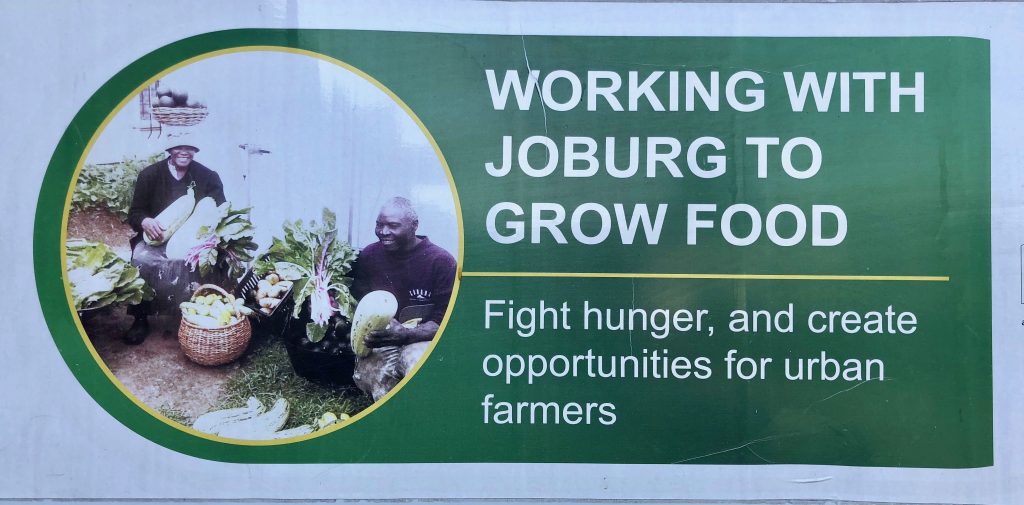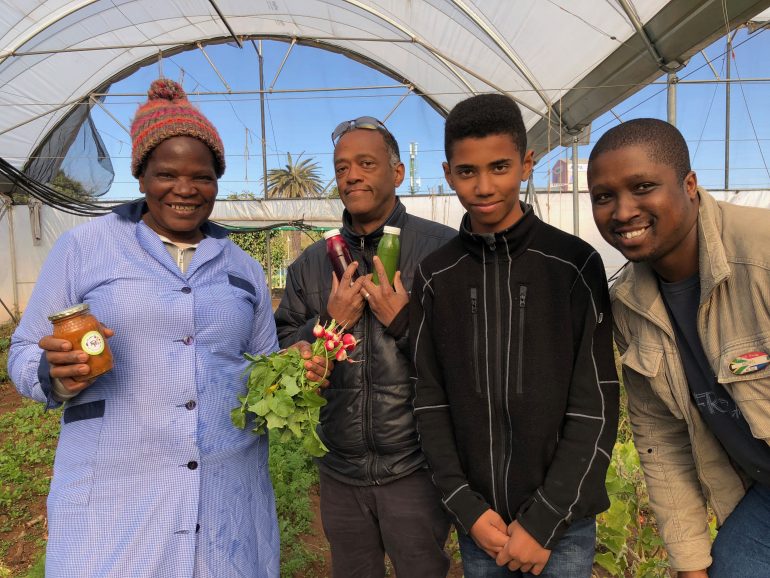from Johannesburg, South Africa.
“Thank you for bringing this young person to visit me,” Mama Refiloe says, “he is our future.” She pulls my son into a tight embrace. “I love you,” she says to him, her warmth so genuine it almost brings me to tears—it feels unexpected and rare in this world. My son beams, his teenage face softening back into what he looked like as a seven year old. We’ve only just met this woman, only just arrived at the community garden that she runs in the center of Johannesburg.
We’d spent the morning, our first in Johannesburg, on a depressing public art tour. Amongst the things that got us down was the poverty and dilapidation of the inner city. It’s what I expected to find in Joburg, I wasn’t surprised, but it was intense. Streets heaped with trash. A prevailing stench of urine and smog. Men passed out on corners, benches, patches of grass, many, many men. I take this all in through a historical lens—this is the legacy of apartheid and colonialism and centuries of exploitation.
As for the public art, a local explains that one of the questions under consideration is how to commemorate the leaders of the anti-apartheid movement. There are statues and murals and mosaics of the big heroes: Nelson Mandela, Walter and Albertina Sisulu, and others. Outside the once-notorious police station, where many activists were killed, is an artwork called “Simakade,” (Zulu for “forever standing”) which features a huge rock bound in wire and mounted on a concrete plinth. “It symbolizes struggle and resilience,” says the artist, Kagiso Pat Mautloa. Many questions come up for me: Who is remembered and why and how? And: Who are the leaders of today? Where are they?
Then we meet Refiloe Molefe and by the end of our time with her, I’m hoping that she will be known around the world. Her leadership is home-grown and down to earth and focused on the elemental need for healthy, nutritious food. “I learned from my grandmother,” she tells me. “She raised me and taught me to plant food.” I hope you’ll keep reading, but I also hope you’ll watch Mama Refiloe, as she’s affectionately known, tell her own story—or a part of it.
Around 2006, Mama Refiloe transformed a vacant plot of land near the city center into a thriving community garden. Today she and her colleagues grow spinach, kale, cabbage, tomatoes, potatoes, and much more—and this is in the winter (which is now in the southern hemisphere). When we were told that the lunch would be all vegetables, my son muttered under his breath, “I want meat.” We were hungry. It was almost 2:30pm. An hour later, he says he’s so satisfied with the meal he didn’t even mind that it was all veggie. And it was: rich and creamy beans, lightly spiced rice, sautéed cabbage, sweet potatoes and squash, a spicy flavorful sauce, and fresh pressed green juice. We have seconds and thirds, commenting on the deliciousness of it all. My son says he wants to drink green juice every day because it gave him so much energy.
Refiloe leads us through the gardens and green houses. Originally, she wanted to grow food for the toddlers she cared for in her day care center whom she knew didn’t get enough to eat. Now she feeds children and teaches them to grow food. “The cabbage you ate was planted by three year olds,” she proudly tells us. This is power—the knowledge to grow your own food, she emphasizes. “I’m drying the seeds there,” she points at a heap of dried plants. “And I’m mulching here.” She’s also munching on everything we pass. She grins, “I eat everything raw,” she says as she nibbles on the leaves of radishes.
As we leave, my son tells her how much he enjoyed the lunch, and again, she reaches out and embraces him and says, “I love you.” He lets himself be folded easily into her strong arms. I’m mesmerized, again, by her warmth. What has she experienced in her 60 years of living, I wonder, through the horrors of apartheid, and how has she cultivated such reserves of strength and kindness? I can’t help but reflect on the hope that grows when you literally watch things grow—when you plant a tiny seed and then see a huge head of cabbage emerge and the satisfaction of then eating it. As we leave and I thank Mama Refiloe, I find myself struggling to find words, I choke up and clumsy sentences tumble out: you inspire me. You give me so much hope. You are a leader. My heart and spirit are full as we drive back into the city center.
If you’re ever in Joburg, do go and visit Mama Refiloe. You can just stop by anytime at Bambanani organic vegetable farm at 46 Bertrams Road, or you can go with Coffeebeans Routes.




